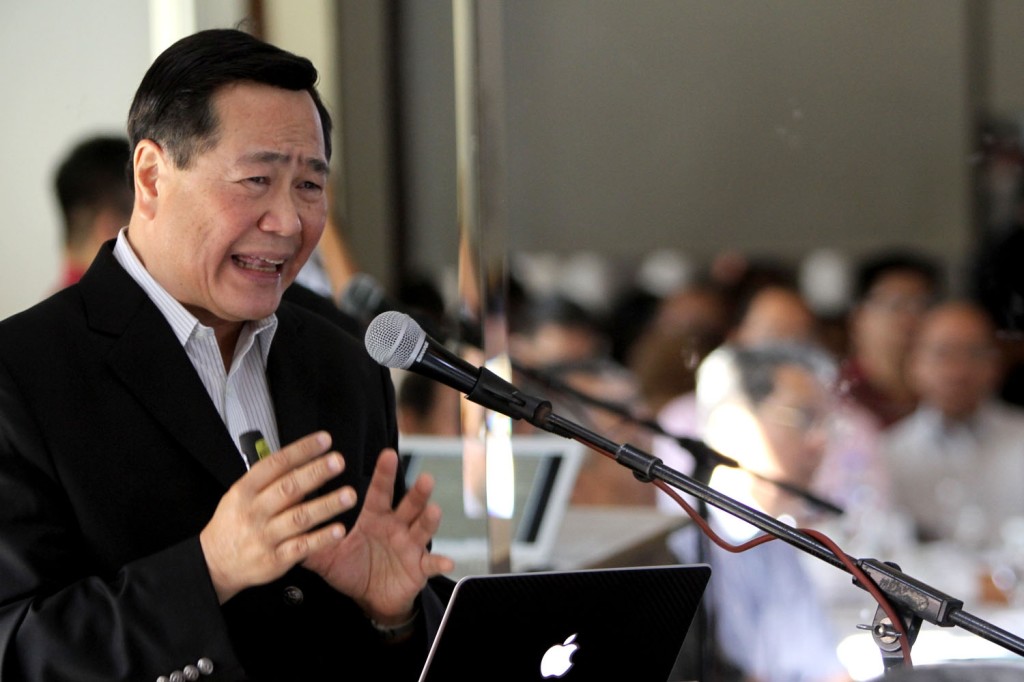Justice bats for credible defense, or face ‘erasure’
THE PHILIPPINES will be “erased from the map” if it fails to have a credible defense force through alliance with the United States, Japan and Australia amid China’s increasingly aggressive behavior in the heavily disputed South China Sea, Supreme Court Associate Justice Antonio Carpio said on Friday.
Carpio said he was confident that the United Nations Permanent Court of Arbitration in The Hague would invalidate China’s claim to almost all of the South China Sea.
“But as to the enforcement of the ruling, we have to strengthen our alliance with the United States, Japan, Australia because they have the capability to enforce the decision in the aspect of freedom of navigation,” Carpio said at the Trident Defense Forum on the South China Sea held at Solaire Resorts in Pasay City.
Carpio urged the incoming administration of President-elect Rodrigo Duterte to wait for the UN tribunal’s decision, which is expected to come down within the next few weeks, before it moves for bilateral or multilateral talks with China to resolve Manila’s territorial dispute with Beijing in the South China Sea.
The Philippines brought the case in 2013 after China seized Panatag Shoal (Scarborough Shoal), a rich fishing ground off the coast of Zambales, after a two-month standoff with the Philippine Navy.
China has ignored the proceedings and says it will not abide by the tribunal’s ruling, insisting it has “undisputed sovereignty” over the South China Sea.
Besides the Philippines, Brunei, Malaysia, Vietnam and Taiwan also have claims in the strategic waterway where $5 trillion in shipborne global trade passes every year and where islets, reefs and atolls are believed to be sitting atop vast energy reserves.
To bolster its sweeping claims, China has built artificial islands on reefs in the Spratly archipelago, topping some of them with airstrips that could be used by military aircraft.
US challenge
China’s activities has raised tensions in the region, and the United States has challenged China’s claims by sending warplanes and warships near the artificial islands in so-called freedom of navigation operations.
The United States and the Philippines have also concluded an Enhanced Defense Cooperation Agreement (Edca) that allows greater access to Philippine military bases for US troops and the stationing in those bases of weapons and equipment.
In his presentation before defense and security experts, Carpio said based on French studies, China’s strong interest and occupation of Panatag Shoal is due to the “deep submarine canyons” in the area that are ideal for “secret submarine passages.”
He said China planned to build an air and naval base on Panatag Shoal to push its plan “to use the South China Sea as a sanctuary for nuclear arms” to counter the UGM-73 Poseidon, the US Navy’s submarine-launched ballistic missile system.
Battle for resources
Carpio, an observer in the arbitration proceedings in The Hague, said the Philippines would have “to fight battles in resources such as rights to oil and gas exploration and fishery.”
“We need to maintain a credible defense force. There is no free lunch when it comes to self-defense,” he said. “All countries that failed to maintain a credible defense force have been erased from the map.”
Once the arbitration court has handed down its ruling, he said, the United States and other global naval powers should proceed with freedom of navigation operations in the South China Sea “so China will be fighting all the naval powers of the world.”
Carpio said the Duterte camp had given assurance that no bilateral talks with China would be held before the tribunal handed down its decision.
Duterte has said he favors bilateral negotiations to resolve the Philippines territorial dispute with China in the South China Sea.
The way to go
Carpio said the Philippines had convinced its allies “that arbitration is the way to go” in resolving the dispute.
He said that while China claims it has the support of some 40 countries, these countries are mostly African and landlocked nations that have no relations in the South China Sea region.
Carpio thanked the G-7 countries, the European Union and members of the Association of Southeast Asian Nations (Asean) for supporting the Philippines in the arbitration case.















